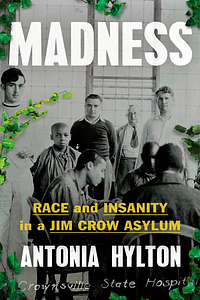Take a photo of a barcode or cover
Reading this was very enlightening and very upsetting. Mental health is a topic not covered well even now, but back when Crownsville was operating, it was way worse. This was especially true with how the evolving field dealt with and handled black patients. It’s a hard read but an important one. As someone who struggles with severe mental illness myself, I had great empathy for those spoken about in this story. The added layer of race is not something I can understand on a personal level, but the book did an excellent job painting the picture clearly. You’ll fully grasp the concept of this asylum, how it worked, how it failed, and the impacts it had on staff, patients, and the black community. This is a must read for anyone who wishes to better understand history from both a mental health standpoint and a black perspective. Both topics are very worthy of your time and attention.
challenging
dark
emotional
informative
reflective
sad
tense
slow-paced
Madness was 10/10! I highlighted and annotated so much reading this book. It’s a multifaceted book in my opinion. While the main premise is about the Crownsville Hospital in Maryland (an asylum). But the author weaves themes of racism, the history of psychiatry, mental health, criminal justice, biography and political tones in a way that I haven’t seen done before. Needless to say, I learned a lot. I highly recommend reading Madness.
Highly recommend this video of Antonia Hylton talking about the book:
https://youtu.be/N0wJeLIYEgM
This book walks through exactly how segregated asylums during the Jim Crow era fit into the US history of institutional racism, filling in the steps between slavery & mass incarceration in an undeniable way. Psychology has done a lot of harm to a lot of people over the years, but I hadn't previously appreciated the differences in experiences in these segregated asylums. What continues to sit with me is how when black employees were finally allowed to work at Crownsville & able to start making a positive impact, lawmakers focused on shifting funds to prisons & pushed to close asylums. Even now, Antonia notes, many black people have their first opportunity to access mental health care once they are imprisoned.
"Christofascist White supremacy is the goal but ableism is the toolkit." - Imani Barbarin
https://youtu.be/N0wJeLIYEgM
This book walks through exactly how segregated asylums during the Jim Crow era fit into the US history of institutional racism, filling in the steps between slavery & mass incarceration in an undeniable way. Psychology has done a lot of harm to a lot of people over the years, but I hadn't previously appreciated the differences in experiences in these segregated asylums. What continues to sit with me is how when black employees were finally allowed to work at Crownsville & able to start making a positive impact, lawmakers focused on shifting funds to prisons & pushed to close asylums. Even now, Antonia notes, many black people have their first opportunity to access mental health care once they are imprisoned.
"Christofascist White supremacy is the goal but ableism is the toolkit." - Imani Barbarin
dark
emotional
informative
sad
challenging
emotional
informative
medium-paced
Well researched, excellent delivery of oral history highlighting the history of the Crownsville hospital in Maryland. Detailed exploration of the intersections between race, health, poverty and gender. Great audiobook. A piece of history otherwise largely overlooked explored compassionately through the lens of folks who experienced various perspectives of the hospital (residents, employees and family and friends of residents and employees).
challenging
dark
emotional
informative
sad
tense
medium-paced
emotional
informative
reflective
medium-paced
challenging
dark
sad
slow-paced
dark
emotional
informative
reflective
medium-paced
Thank you to Grand Central Publishing and Netgalley for this advanced copy!
What an incredible chronicling of not only our collective failure to address mental health issues in the United States but our collective negligence to understand the horrors we inflicted on black Americans in the name of "mental health" and "community safety". Hylton does an excellent job of weaving the story of one place where people were placed either for treatment or punishment, focusing on the residents, staff, and the effect Crownsville had on the local community. The stories are both individual and indicative of systemic failures and purposeful ignorance. I appreciated the author's style and introduction of people, showing kindness when needed and indictment when called for. A must-read for those interested in the effects of systemic racism or the history of mental health in the United States.
What an incredible chronicling of not only our collective failure to address mental health issues in the United States but our collective negligence to understand the horrors we inflicted on black Americans in the name of "mental health" and "community safety". Hylton does an excellent job of weaving the story of one place where people were placed either for treatment or punishment, focusing on the residents, staff, and the effect Crownsville had on the local community. The stories are both individual and indicative of systemic failures and purposeful ignorance. I appreciated the author's style and introduction of people, showing kindness when needed and indictment when called for. A must-read for those interested in the effects of systemic racism or the history of mental health in the United States.







